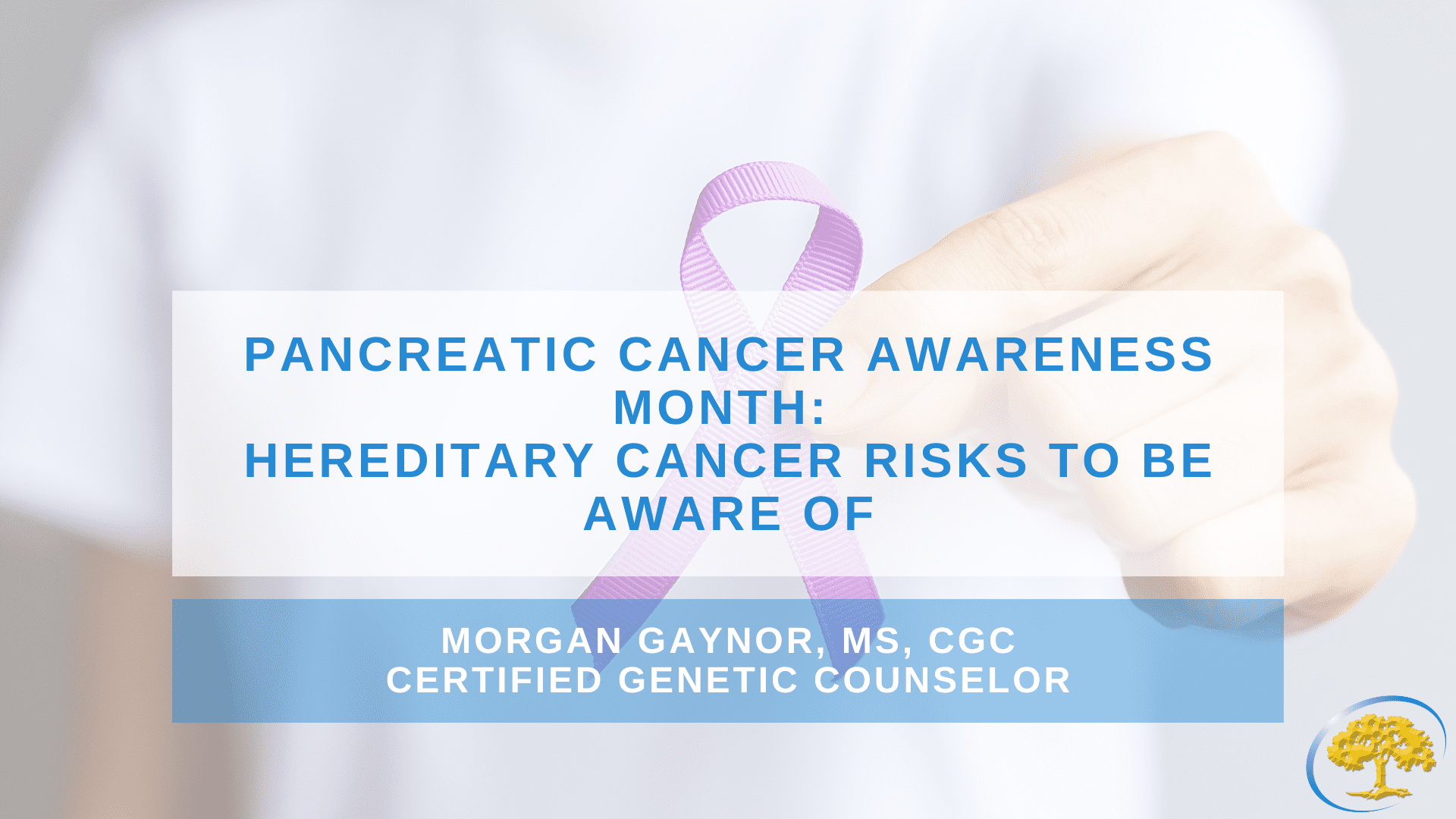
Posted 1 year ago
Pancreatic Cancer Awareness Month: Hereditary Cancer Risks to be Aware of
Pancreatic Cancer Awareness Month brings attention to one of the most challenging cancers to detect early and treat. While most pancreatic cancers occur sporadically, meaning they arise without a known genetic cause, approximately 10-15% are linked to inherited genetic mutations. For patients with a strong family history of pancreatic cancer or a known mutation, genetic testing can help clarify their risk and guide screening and management decisions. Some of the most well-known genes associated with pancreatic cancer can be found below.
1. BRCA1 and BRCA2: Though primarily associated with breast and ovarian cancer, mutations in BRCA1 and BRCA2 also increase the risk of pancreatic cancer. These mutations are also associated with an increased risk for prostate cancer, male breast cancer, and melanoma.
2. PALB2: Mutations in PALB2 are associated with an increased risk of breast, ovarian, and pancreatic cancers as well.
3. CDKN2A: Mutations in the CDKN2A gene are known to increase the risk of both pancreatic cancer and melanoma.
4. STK11 (Peutz-Jeghers syndrome): STK11 mutations cause Peutz-Jeghers syndrome, a condition characterized by gastrointestinal polyps and a significantly increased risk of several cancers, including pancreatic cancer. These mutations are also associated with an increased risk of endometrial, cervical, ovarian, testicular, breast, and lung cancers. Individuals with PJS usually have distinct blue or brown freckled areas on the lips or gums.
5. Lynch Syndrome (MLH1, MSH2, MSH6, PMS2, and EPCAM): Lynch syndrome is primarily associated with colorectal, endometrial, and ovarian cancers, but it also increases the risk of pancreatic cancer. Lynch syndrome may also increase the risk of stomach, small intestine, urinary tract cancer, bladder, biliary tract, and brain cancers. There may also be an increased chance for certain skin manifestations.
6. ATM: Mutations in the ATM gene, associated with ataxia-telangiectasia, also confer an increased risk of pancreatic cancer. Mutations in ATM also increase the risk of breast cancer, ovarian cancer, and possibly prostate cancer and male breast cancer.
Pancreatic cancer often lacks symptoms in its early stages, making it difficult to detect before it has spread. This is where the role of genetic testing becomes vital. For individuals who carry high-risk gene mutations, enhanced surveillance with specialized imaging techniques offers the best chance for early detection. For individuals with mutations in these genes, the imaging techniques below may be recommended:
– Endoscopic Ultrasound (EUS): This involves a small ultrasound probe inserted into the digestive tract to capture detailed images of the pancreas.
– Magnetic Resonance Imaging (MRI): A non-invasive technique using magnetic fields to create detailed images of the pancreas, often used in combination with MR cholangiopancreatography (MRCP) for clearer views of pancreatic ducts.
– Family history may also be taken into account when considering these management strategies.
Pancreatic Cancer Awareness Month reminds us of the importance of understanding genetic risks and their implications for early detection and management. By identifying hereditary cancer risks, patients can work with their healthcare teams to implement tailored screening strategies, ultimately improving the chances of early detection and treatment. If you have questions about pancreatic cancer or other hereditary cancer predisposition syndromes, please speak to your Ironwood provider about a referral to Ironwood’s Genetic Services department.
Morgan Gaynor, MS, CGC
Certified Genetic Counselor
Morgan Gaynor Joined Ironwood Cancer & Research Centers In May 2022. She Earned Her B.S. In Molecular Biology And Genetics From Regis University And Earned Her M.S. In Genetic Counseling From The University Of Arizona.
During Her Time At The University Of Arizona, Morgan Completed A Two-Year Graduate Program And A Thesis On Best Practices In Counseling Low-Level Pathogenicity Results In Cancer Genetics Settings. She Completed Clinical Rotations At Prominent Healthcare Systems Such As Banner, Mayo Clinic, Color Genomics, Phoenix Children’s Hospital, And Dignity Health. During Her Time At These Institutions, She Gained Experience In Prenatal, Cancer, Cardiology, Pediatrics, And Pharmacogenomics Counseling.
Morgan Enjoys Running, Swimming, Cycling, Playing Piano, Hiking, And Spending Time With Her Family.
Please ask your Ironwood Cancer & Research Centers doctor for a referral to see our genetic counselor.

